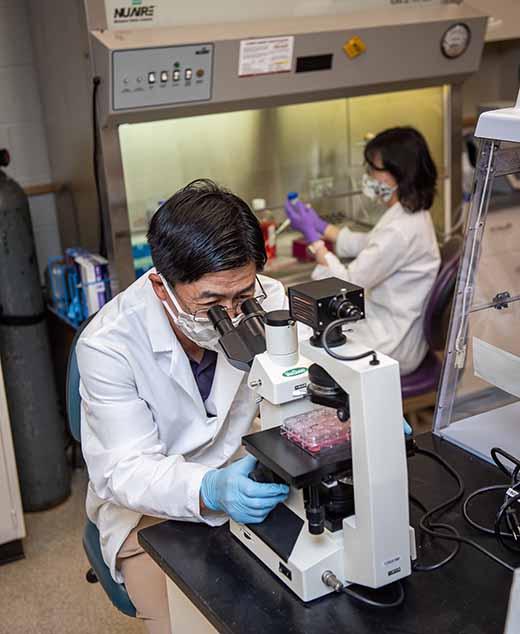
Credit: Kansas State University
MANHATTAN, KANSAS — A recent study by Kansas State University virologists demonstrates successful postinfection treatment for SARS-CoV-2, the virus that causes COVID-19.
College of Veterinary Medicine researchers Yunjeong Kim and Kyeong-Ok “KC” Chang published the study in the prestigious journal Proceedings of the National Academy of Sciences of the United States of America, or PNAS. They found that animal models infected with SARS-CoV-2 and treated with a deuterated protease inhibitor had significantly increased survival and decreased lung viral load.
The results suggest that postinfection treatment with inhibitors of proteases that are essential for viral replication may be an effective treatment against SARS-CoV-2. These protease inhibitors are a class of antiviral drugs that prevent viral replication by selectively binding to viral proteases and blocking the activation of proteins that are necessary for the production of infectious viral particles.
“We developed the protease inhibitor GC376 for treating a fatal coronavirus infection in cats, which is now under commercial development as an investigational new animal drug,” said Kim, associate professor of diagnostic medicine and pathobiology. “After COVID-19 emerged, many research groups reported that this inhibitor is also effective against the coronavirus that causes COVID-19, and many are currently pursuing the development of protease inhibitors as a treatment.”
Kim and Chang modified GC376 using a tool called deuteration to test its efficacy against SARS-CoV-2.
“Treating SARS-CoV-2-infected mice with deuterated GC376 significantly improved survival, viral replication in lungs and weight losses, which shows the efficacy of the antiviral compound,” said Chang, professor of diagnostic medicine and pathobiology. “The results suggest deuterated GC376 has a potential for further development, and this deuteration method can be utilized to other antiviral compounds to generate potent inhibitors.”
The virologists are continuing to develop improved inhibitors using various methods. Deuterated GC376 is currently being evaluated for further potential development.
###
Previous work done by Kim and Chang is continuing development through licensing agreements with industry partners.
Media Contact
Kyeong-Ok Chang
[email protected]
Original Source
https:/
Related Journal Article
http://dx.




